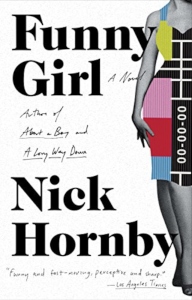Having recently had my Nick Hornby interest piqued by the film adaptation of “Juliet, Naked” (based on his 2009 novel), I finally read his 2014 entry “Funny Girl.” The description sounds sort of like “The Marvelous Mrs. Maisel”: A young woman in the 1960s wants to be a comedy actress rather than working in her hometown department store. The novel ends up being quite different from “Maisel,” but the genre is the same: It’s historical fiction that reflects the reality of the time and place but invents fictional famous people and touchstones.
Specifics of the era
“Funny Girl” starts slowly, with the focus on Barbara, who aims to get out of her blue-collar Blackpool life to the entertainment scene in London. A hundred pages in, it’s clear this is an ensemble piece about all the makers of the BBC sitcom “Barbara (and Jim).” In addition to leads Barbara – who changes her name to Sophie Straw on her agent’s recommendation – and Clive, we get to know writers Tony and Bill and producer Dennis.
“Funny Girl” digs into the specifics of developing a TV program in this era, and as is always the case with Hornby novels, the real-world details and the way people talk about them and deal with them are funny. Similar to how “Juliet, Naked” is about a music album we can’t actually hear, “Funny Girl” is about a TV show we can’t actually watch. But Hornby’s descriptions do the trick. I imagine a proto-“Seinfeld,” especially when he describes episodes such as “The New Bathroom,” which chronicles Jim and Barbara doing their own plumbing work.

Hornby comments on issues of 1960s Britain by having his characters navigate through them. Sophie fends off her agent’s attempts to land her roles like the girl who gets painted gold in a James Bond film; luckily, her first show is a hit, so she dodges that sort of stereotyping. Even as blond bombshell Sophie tiptoes into a slightly more sexually free culture, writers Tony and Bill try slightly edgier things in their scripts, but it isn’t easy on the taxpayer-funded BBC. They tiptoe forward: Simply portraying problems in a marriage is groundbreaking.
The writing partners serve as foils for each other in their non-work lives, as both deal with out-of-the-ordinary sexual orientations. Tony marries a woman, and initially struggles in bed even though he loves her, while Bill enters the burgeoning homosexual scene in London. As a good-looking actor, Clive enjoys how easy it is to land women. Dennis pines after Sophie, having loved her at first sight.
Himself an entertainment critic, Hornby provides a couple of newspaper critics’ write-ups on “Barbara (and Jim),” which give us a feel for the type of show it is, how people are responding to it and how it fits into the zeitgeist. In a very funny segment, Dennis goes on a TV talk show to debate the merits of sitcoms with a stuffed-shirt scholar who believes they have no value. Dennis destroys the academic by noting that Shakespeare wrote for the masses, too.

It’s not easy to go mainstream
“Funny Girl” makes a strong case that it’s not easy to make something that nearly half of the country’s population tunes in to, while at the same time showing how the format stifles Tony’s and Bill’s creative impulses. Bill, indeed, is writing a book on the side. We also see the scribes struggling at times; Hornby tells of creative peaks and spikes in popularity, creative valleys and dips in popularity.
In the end, I came out happy that I learned more about 1960s British TV – not because I necessarily adore the subject but rather because Hornby makes the journey with these five people so engrossing and enjoyable.
A final segment of “Funny Girl” is bittersweet and nostalgic as we jump to present day. Sophie, who went on to a successful acting career, wonders how she can be old when she grew up in the time of color TV and pop music. Meanwhile, Hornby adds another sad/funny real-world detail: Most episodes of “Barbara (and Jim)” were taped over by the BBC.
This will be a particularly challenging book to adapt to film (“Funny Girl” and 2003’s “How to Be Good” are his only novels not to be adapted yet), because so many details have to be pitched just right. I’d be thrilled if the makers of “Juliet, Naked” took a crack at it.

